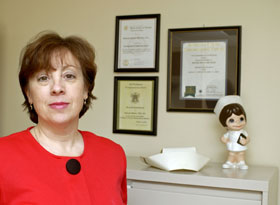Nursing Professor Focuses On
Psychiatric Needs Of Kids In Jail
 |
| Deborah Shelton, an associate professor, says nurses have special opportunities to help juvenile offenders. |
|
Photo by Peter Morenus |
Early in her career as a psychiatric nurse, Deborah Shelton was curious about how young prisoners get mental health services while incarcerated. She tried to find research on the subject.
“There was no literature,” says Shelton, now an associate professor of nursing at UConn. “Nobody knew what was going on behind bars, because these children were locked up in these walled, cage-like places.”
So Shelton went into juvenile jails and prisons to see what kind of services were provided for young offenders, and to begin creating the literature. For more than 20 years, she has conducted research studies, published articles in nursing journals, and presented her findings at international conferences, helping to develop the field of juvenile forensic psychiatric nursing.
Shelton’s writing and research has appeared in the Journal of Nursing Scholarship, Journal of Pediatric Nursing, and Journal of Psychosocial Nursing, among others, and she has delivered presentations at nursing conferences in both the United States and England.
Her career achievements were recognized with the 2004 Achievement Award from the International Association of Forensic Nursing.
“Her scholarly endeavors have truly epitomized the integration of theory, practice, research, education, and policy development as integrative aspects of forensic nursing science,” says the letter nominating Shelton for the prestigious award.
Shelton’s research and writings in a variety of nursing subspecialties, along with her experience developing public policy for the mental health needs of juveniles at risk, established her as an advocate for youthful offenders. Her most recent activity before arriving at UConn in fall 2004 was helping to get legislation approved in Maryland for a juvenile justice mental health bill.
Shelton says nurses have special opportunities to help juvenile offenders, who often find themselves in trouble due to circumstances beyond their own control. Nurses may be engaged in providing health education information or promoting good health habits to incarcerated youth when they identify other health issues, such as the need for mental health services.
She says an important part of helping an at-risk child is being able to make an individual connection with the child. “When I go into a detention center and a child I have made some contact with is standing at the door looking through the window, waiting because I’m coming, I know I’ve made contact,” she says. “Not all children will be saved, but you can help a lot of them.”
Shelton says nurses today find themselves on the front lines of care for many of a community’s most vulnerable people, such as an elderly grandparent who may be raising a teenager who has gotten pregnant, or a parent struggling with a child who is a drug addict.
Even as they struggle with their problems, families of troubled youth can provide some level of help for their children, says Shelton. “Even in families with drug addiction, the parents would tell me that just because they are not doing such a good job with their children doesn’t mean they don’t care about them. They may never be the parent we all would like them to be, but there is something they can contribute. And when I talk to children, their family is so very important to them, as dysfunctional as it may be.”
Since arriving at the University last year, she has worked to develop an advanced practice in psychiatric nursing in Connecticut, based on the interest among UConn students. Shelton also has started meeting with officials in the city of Hartford to gain funding for an intervention program for pre-adolescent children that uses expressive art – such as movement, visual arts, and music – that she developed while working in Maryland.
“We have this opportunity to help,” Shelton says. “Let’s not waste that opportunity to make some difference in redirecting these children’s lives. Let’s not lose them.”

